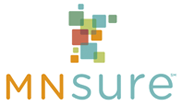Employer-Sponsored Insurance (ESI)
When applying for health coverage with financial help, you'll need to report information about any employer-sponsored insurance (ESI) available to you, even if you are not enrolled in it. Access to ESI can affect your eligibility for financial help.
ESI is coverage under a group health plan (including self-insured plans), such as:
- Coverage through an employer to an employee and their spouse and dependents, including some health reimbursement arrangements (HRAs)
- Retirement benefits
- Continuation coverage required under federal or state law, such as health coverage through the Consolidated Omnibus Budget Act (COBRA)
Union and student health coverage are not considered ESI.
Gathering and Reporting ESI Information
Work with your employer to have the information you'll need to answer ESI questions on the MNsure application with financial help. Using the form Appendix A: Health Coverage from Jobs (PDF) will help you gather the information you will need to complete ESI questions on the application.
You should always accurately report access to ESI, even if you may be eligible for Medical Assistance.
A change to a health care rule makes more families eligible for lower-cost health insurance.
This change fixed the “family glitch” – a situation where only the cost of individual coverage was used to determine if the plan was affordable for the family, even if the cost of family coverage was much higher. Because of the change more family members with offers of family ESI may now qualify for an advanced premium tax credit.
To find out if your ESI may be considered unaffordable, use the Employer Insurance Affordability Estimator.
Get Free Help
Need help understanding ESI and how to report it on your application? Get free help from a MNsure-certified broker.
How ESI Can Affect Eligibility for Financial Help
Consumers who have access to ESI or other minimum essential coverage (MEC) may not be eligible for financial help.
Private health plans with financial help (advanced premium tax credit):
- If you are enrolled in ESI, you are not eligible for financial help.
- If you have access to but are not enrolled in ESI, you are not eligible for advanced premium tax credit if all of the following apply:
- The employer's plan meets the minimum value standard. This means it covers 60% of the total allowed costs of benefits provided under the plan.
- The employer's plan is considered affordable. This means the annual premium amount the employee pays for coverage in 2024 is not more than 8.39% of the employee's projected annual tax household income for 2024. The affordability calculation for self-only ESI uses the cost of coverage for the employee only. To determine affordability for family coverage the cost to cover the employee’s family is used and must not be more than 8.39% of the employee’s projected annual tax household income for 2024.
- The percentage used to determine affordability of ESI is established by the IRS and changes for each tax year.
MinnesotaCare:
- If you are enrolled in ESI, you are not eligible for MinnesotaCare.
- If you have access to but are not enrolled in ESI, you are not eligible for MinnesotaCare if all of the following apply:
- The employer's plan meets the minimum value standard. This means it covers 60% of allowed costs and covers most inpatient hospital and physician services.
- The employer's plan is considered affordable. The percentage used to determine affordability of ESI is established by the IRS and changes for each tax year.
- For employees, this means the annual premium amount the employee pays for self-only coverage in 2024 is not more than 8.39% of the household's projected annual tax household income for 2024.
- For family members, the cost to cover the employee’s family must not be more than 8.39% of the household’s projected annual tax household income for 2024.
- The employer's plan meets the minimum value standard. This means it covers 60% of allowed costs and covers most inpatient hospital and physician services.
Medical Assistance:
- You can be eligible for Medical Assistance if you are enrolled in ESI or if you have access to ESI, even if the coverage meets the minimum value standard and is considered affordable.
- If the ESI is considered 'cost-effective', Medical Assistance may pay the employee’s premiums.
